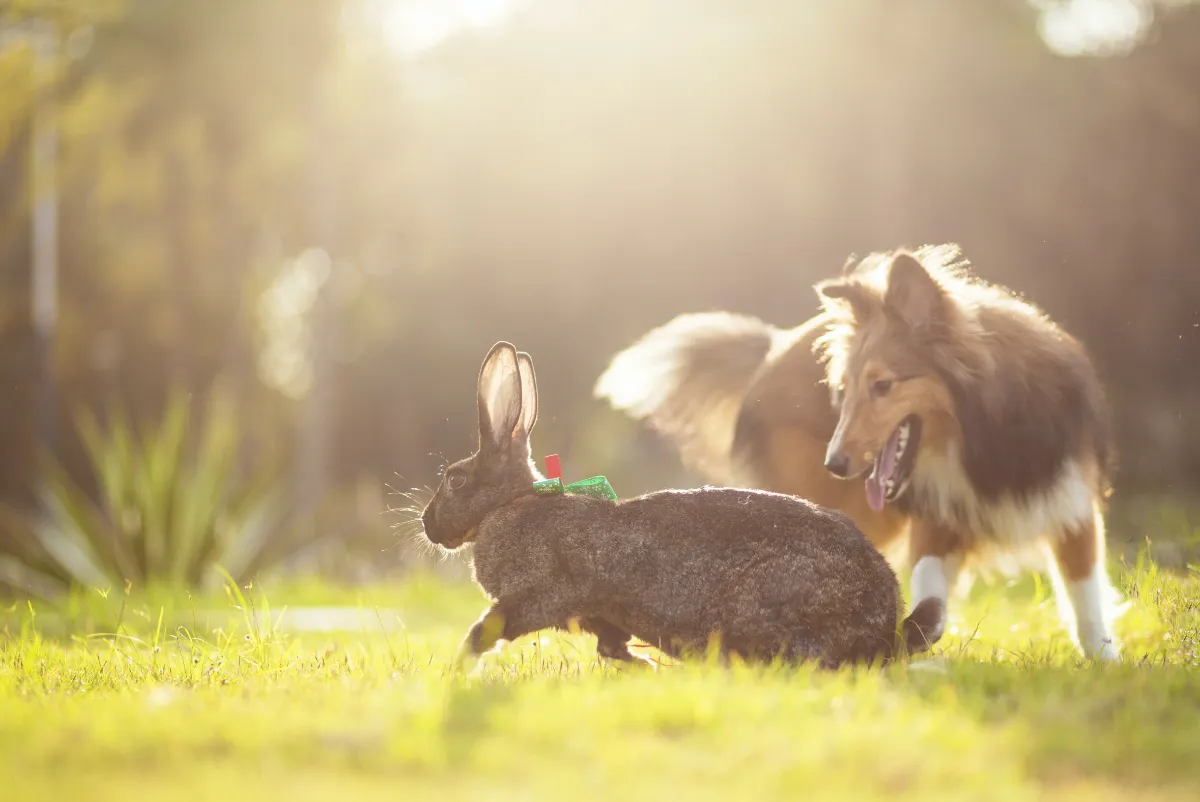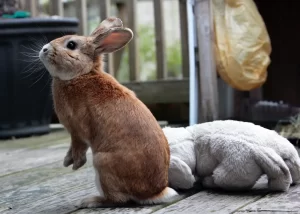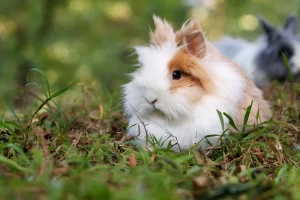Do you ever wonder why rabbits spray? It’s a behavior that can leave you scratching your head.
Well, fear not, because in this article, we will delve into the fascinating world of rabbit behavior. We’ll uncover the reasons behind their spraying habits, from marking territory to communicating with others.
We’ll also explore the hormonal influences and stress factors that can contribute to this behavior.
So, sit tight and get ready to unravel the mystery of why rabbits spray.
In This Article
Key Takeaways
- Rabbits spray urine to mark their territory and communicate boundaries.
- Unneutered rabbits are more likely to engage in spraying behavior.
- Environmental factors can influence rabbits’ spraying habits.
- Understanding communication patterns and hormonal influences can help manage and redirect spraying behavior in rabbits.
Natural Instincts and Behavior
Do you ever wonder why your pet rabbit instinctively burrows and hides?
Well, it all comes down to their natural instincts and behavior. Rabbits are prey animals, which means they’ve evolved certain behaviors to ensure their survival in the wild. One of these behaviors is burrowing, which allows them to create a safe and secure hiding place. Burrowing not only helps them avoid predators, but it also provides protection from extreme weather conditions.
Additionally, rabbits are known for their breeding habits. They’re highly territorial animals and will mark their territory by spraying urine. This behavior is more common in unneutered rabbits and is a way for them to communicate and establish dominance. Environmental factors, such as the presence of other rabbits or changes in their surroundings, can also influence these behaviors.
Understanding these natural instincts and behaviors can help you provide a suitable and enriching environment for your pet rabbit.
Marking Territory
When caring for your pet rabbit, it’s important to understand that they may mark their territory by spraying urine, especially if they are unneutered. This behavior is a natural instinct for rabbits and is their way of communicating and establishing boundaries. However, it can be quite unpleasant for you as a pet owner. To address this issue, behavioral training and environmental enrichment are key.
Behavioral training involves teaching your rabbit alternative ways to express their territorial instincts. You can use positive reinforcement techniques to reward desired behaviors, such as using a litter box or scent-marking toys. Additionally, providing your rabbit with plenty of environmental enrichment can help redirect their spraying behavior. This can include providing them with hiding places, tunnels, and toys to keep them mentally stimulated and engaged.
By implementing these strategies, you can help reduce or eliminate your rabbit’s spraying behavior and create a harmonious living environment for both you and your furry friend.
| Behavioral Training | Environmental Enrichment |
|---|---|
| Positive reinforcement | Hiding places |
| Litter box training | Tunnels |
| Scent-marking toys | Toys for mental stimulation |
Communication and Social Hierarchy
You should actively observe and analyze the communication patterns within your rabbit’s social hierarchy. Understanding how rabbits communicate with each other is crucial in maintaining a harmonious environment for your furry friends.
Rabbits, like many other animals, have a hierarchical social structure. In this structure, dominant rabbits establish their status through various forms of communication, such as body language, vocalizations, and scent marking. Aggressive behavior may occur within the social hierarchy as rabbits establish their dominance or compete for resources.
Reproductive competition can also influence communication patterns, especially during mating season when males may display more aggressive behaviors towards each other.
Hormonal Influences
Pay attention to how hormonal influences can impact your rabbit’s behavior and overall well-being.
Hormonal changes in rabbits can have a significant effect on their reproductive behavior. As rabbits reach sexual maturity, their hormones start to fluctuate, leading to changes in their behavior.
Male rabbits, for example, may become more territorial and aggressive, while female rabbits may display nesting behaviors and become more receptive to mating. These hormonal changes can also lead to spraying, a behavior where rabbits mark their territory by urinating on objects or surfaces.
While this behavior is natural for rabbits, it can be problematic when it occurs inside the house. Understanding the hormonal influences on your rabbit’s behavior can help you better manage their reproductive behavior and ensure their overall well-being.
Stress and Anxiety
Don’t let stress and anxiety negatively impact your rabbit’s behavior and overall well-being. Rabbits are sensitive creatures, and just like humans, they can experience stress and anxiety. Understanding the causes and finding ways to prevent these emotions in your furry friend is crucial for their health.
Here are some key points to consider:
- Causes and prevention:
- Loud noises, sudden changes in environment, and lack of social interaction can all contribute to stress and anxiety in rabbits.
- Providing a safe and quiet space, maintaining a consistent routine, and offering plenty of mental and physical stimulation can help prevent these negative emotions.
- Health effects:
- Prolonged stress and anxiety can lead to a weakened immune system, digestive issues, and behavioral problems in rabbits.
- It’s important to address these issues promptly to prevent further health complications.
- Remedies:
- Creating a calm and enriched environment, offering hiding spots, and providing companionship can help alleviate stress and anxiety in rabbits.
- Additionally, activities like grooming, gentle petting, and providing toys for mental stimulation can also be beneficial.
Tips for Managing Rabbit Spraying
If your rabbit is spraying, try providing them with additional litter boxes throughout their living space to help manage the behavior. Rabbits may spray as a form of communication or territorial marking, and offering multiple litter boxes can give them more options to express these behaviors in a more appropriate manner.
By placing litter boxes in different areas, you can create a sense of territory for your rabbit and reduce the need for spraying. Additionally, ensure that the litter boxes are cleaned regularly to maintain hygiene and prevent odors that may trigger spraying.
If the behavior persists, consider consulting a veterinarian or a rabbit behavior specialist who can provide further guidance on behavioral issues and training techniques.
| Behavioral Issues | Training Techniques |
|---|---|
| Spraying | Provide additional litter boxes |
| Territorial marking | Clean litter boxes regularly |
| Communication | Consult a veterinarian or behavior specialist |
Frequently Asked Questions
What Is the Lifespan of a Rabbit?
The lifespan of a rabbit depends on various factors such as breed, genetics, and care. On average, rabbits live for 8 to 12 years. Proper rabbit breeding and a balanced diet contribute to their longevity.
How Do Rabbits Communicate With Each Other?
Rabbits communicate with each other through a complex system of social hierarchy. They use vocalizations and body language to convey their intentions and establish dominance. Understanding these signals can help you better understand your rabbit’s behavior.
Can Spaying or Neutering a Rabbit Prevent Spraying Behavior?
Spaying or neutering your rabbit can totally prevent spraying behavior. It’s like magic! The procedure has a positive effect on their behavior, reducing aggression and marking territory. So go ahead and schedule that appointment!
Are There Any Medical Conditions That Can Cause Rabbits to Spray?
Medical conditions, such as urinary tract infections or hormonal imbalances, can cause rabbits to spray. It’s important to consult a veterinarian to determine the underlying cause and develop a treatment plan.
Can Rabbit Spraying Be a Sign of Aggression?
Rabbit spraying can indeed be a sign of aggression. Understanding the reasons behind this behavior is crucial. It may be territorial marking or a way for rabbits to assert dominance.
Conclusion
In conclusion, rabbits spray as a natural instinct to mark their territory and communicate with other rabbits. This behavior is influenced by hormones and can also be triggered by stress and anxiety. By understanding these reasons, rabbit owners can better manage spraying behaviors.
Just as a painter adds brushstrokes to create a masterpiece, rabbits use spraying as their artistic way of expressing themselves and claiming their space in the world.





